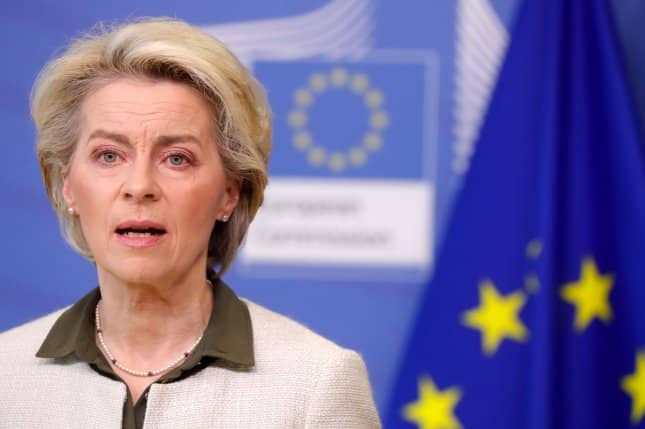EU agrees on deal to force Big Tech platforms to remove illegal content

European Union lawmakers agreed Saturday on a landmark law to force tech giants such as Google and Meta to rid their platforms of illegal content.
The lawmakers reached a sweeping, provisional political agreement on the Digital Services Act after hours of deliberation.
EU President Ursula von der Leyen called the agreement “historic” in a statement.
“Today’s agreement on the Digital Services Act is historic, both in terms of speed and of substance,” she said. “It will ensure that the online environment remains a safe space, safeguarding freedom of expression and opportunities for digital businesses.”
Under the agreement, “what is illegal offline” in the European Union “must also be illegal online,” the European Council said in a statement on the agreement.
Illegal content is defined in the proposal for the law as “hate speech” or “terrorist content,” unlawful discriminatory content and content that relates to illegal activities, such as child sexual abuse. The proposal also includes efforts to ensure safety of products sold online and a memorandum of understanding to prevent counterfeit goods in online marketplaces.
Large online platforms must also carry out an annual assessment on reducing risk in six areas under the new law.
As defined by the EU, those areas include dissemination of illegal content; adverse effects on fundamental rights; manipulation of services “having an impact on democratic processes and public security”; adverse effects on gender-based violence; adverse effects on minors; and “serious consequences for the physical or mental health of users.”
In particular, platforms will be prohibited from targeted advertising to minors using their personal data, while misleading interfaces known as “dark patterns” will also be banned under the DSA.
“In the context of the Russian aggression in Ukraine and the particular impact on the manipulation of online information, a new article has been added to the text introducing a crisis response mechanism,” the EU said.
The mechanism will analyze the impact of the crisis in question and put measures in place to “for the respect of fundamental rights.”
If platforms fail to comply with the new rules, they may be fined up to 6% of their gross revenue.
“We welcome the DSA’s goals of making the internet even more safe, transparent and accountable, while ensuring that European users, creators and businesses continue to benefit from the open web,” a Google spokesperson said. “As the law is finalized and implemented the details will matter.”
A Twitter spokesperson similarly said the company is looking forward to reviewing the details of the DSA.
“We support smart, forward thinking regulation that balances the need to tackle online harm with protecting the Open Internet — while also understanding that a one-size-fits all approach fails to consider the diversity of our online environment,” the company said.
“It’s Twitter’s top priority to keep people safe online and protect the health of the public conversation, and within the Digital Services Act, we welcome the increased focus on healthier digital spaces in the EU.”
The European Union announced the legislation in December 2020, including the DSA and a separate Digital Markets Act aimed at the restraining unfair marketing practices that stifle competition — the latter measure was approved last month.
EU competition chief Margrethe Vestager said in a video posted to Twitter Saturday the final form of the agreement is better than the proposal first introduced in 2020.
“It’s not a slogan anymore that what is illegal offline should also be seen and dealt with as illegal online,” Vestager said. “Now, it’s a real thing, democracy is back, helping us to get our rights and to feel safe when we are online.”





